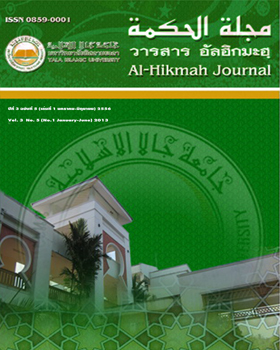Effects of Project - Based Learning on Learning Achievement, Science Process Skills and Attitude Towards Science of Mathayomsuksa Two Students
Keywords:
Project base learningAbstract
This research aimed to study the effects of project - based learning on science achievement, science process skills and attitude towards science of mathayomsuksa two students. The sample group of this research were 23 students in mathayomsuksa two classroom at Riengrat Uppatum School, Ruso District, Yala Province during the first semester of 2010 academic year, received by purposive sampling. They were instructed using Project - based learning Approach for 16 hours. The research instruments consisted of lesson plans for the project-based learning , achievement test, science process skills test, students’ attitudes towards science evaluation test, the researcher’s field- note, the interview recording forms for students’ attitudes towards learning activities and the interview recording forms for science teachers’ knowledge about project-based learning. The experimental research was conducted using one group pretest-posttest design. The data was analyzed by mean, standard deviation and t-test. The research findings were as follows:
- The comparison between mean score and criteria of 60% of total score indicated that students’ mean score was higher than the criteria at the .05 level of significance.
- Students learning by project-based learning approach had the post-test mean score on science achievement higher than the pre-test mean score at the .05 level of significance.
- Students learning by project-based learning approach had the post-test mean score on science process skills higher than the pre-test mean score at the .05 level of significance.
- Students’ attitudes towards science were positively high.
- Students were able to develop positive learning behaviors, inquiry, creative thinking, group process, confident and apply knowledge to their daily lives which leaded students to study happily.
- The science teachers gained more knowledge about project-based learning after using project-based learning approach in their class.
References
ทิศนา แขมมณี. 2547. ศาสตร์การสอน: องค์ความรู้เพื่อการจัดกระบวนการเรียนรู้ที่มีประสิทธิภาพ. พิมพ์ครั้งที่ 3. กรุงเทพฯ: สำนักพิมพ์แห่งจุฬาลงกรณ์มหาวิทยาลัย.
ธีรชัย ปูรณโชติ. 2531. การสอนกิจกรรมโครงงานวิทยาศาสตร์: คู่มือสำหรับครู. กรุงเทพฯ: จุฬาลงกรณ์มหาวิทยาลัย.
เบญญา ศรีดารา. 2545. การเปรียบเทียบกระบวนการวิทยาศาสตร์ และเจตคติเชิง วิทยาศาสตร์ของนักเรียนชั้นประถมศึกษาปีที่ 5 ที่เรียนโดยการทำกิจกรรมโครงงานวิทยาศาสตร์และการเรียนรู้ตามคู่มือครู. วิทยานิพนธ์ปริญญา
การศึกษามหาบัณฑิต สาขาหลักสูตรและการสอน มหาวิทยาลัย มหาสารคาม.
ภพ เลาหไพบูลย์. 2540. แนวการสอนวิทยาศาสตร์. พิมพ์ครั้งที่ 2. กรุงเทพฯ: ไทยวัฒนาพานิช.
มนัสชนก อุดมดี. 2550. การพัฒนาทักษะกระบวนการทางวิทยาศาสตร์ของนักเรียนที่เรียนโดยกิจกรรมการเรียนรู้แบบโครงงาน. วิทยานิพนธ์ปริญญาการศึกษามหาบัณฑิต สาขาหลักสูตรและการสอน มหาวิทยาลัยราชภัฎสกลนคร.
มาฆะ ทิพย์คีรี. 2547. การวิจัยการสอนโครงงานระดับมัธยมศึกษา. กรุงเทพฯ: บริษัทพัฒนาคุณภาพวิชาการ (พว.) จำกัด.
มัณฑนี โคตรมี. 2548. การพัฒนาทักษะกระบวนการทางวิทยาศาสตร์ขั้นพื้นฐานโดยใช้แผนการจัดการเรียนรู้แบบโครงงาน เรื่อง สารในชีวิตประจำวัน. วิทยานิพนธ์ปริญญาการศึกษามหาบัณฑิต สาขาหลักสูตรและการสอน บัณฑิตวิทยาลัย มหาวิทยาลัยมหาสารคาม.
ลัดดา ภู่เกียรติ. 2544. โครงงานเพื่อการเรียนรู้ หลักการและแนวทางการจัดกิจกรรม. กรุงเทพฯ: จุฬาลงกรณ์มหาวิทยาลัย.
วิมลศรี สุวรรณรัตน์ และมาฆะ ทิพย์ศรี. 2542. พัฒนาทักษะวิทยาศาสตร์ โครงงานวิทยาศาสตร์. กรุงเทพฯ: เดอะมาสเตอร์กรุ๊ป แมเนจเม้นท์.
อภิญญา ซื่อตระกูลพานิชย์. 2550. ผลสัมฤทธิ์ทางการเรียน ทักษะกระบวนการทางวิทยาศาสตร์ และความคิดสร้างสรรค์ทางวิทยาศาสตร์ของนักเรียนชั้นมัธยมศึกษาปีที่ 1 โดยใช้วิธีการสอนแบบโครงงานวิทยาศาสตร์. วิทยานิพนธ์ปริญญาการศึกษามหาบัณฑิต สาขาวิทยาศาสตรศึกษา มหาวิทยาลัยขอนแก่น.
Buck Institute for Education. 2007. New Tech Network school: Results of the National Survey of PBL and High School Refore. Novato, CA : Author. Availablefrom http://www.bie.org/research/library (2010 Feb 3)
Buck Institute for Education. 2009. PBL Starter Kit: To-the-Point Advice, Tools and Tips for Your First Project. Introduction chapter free.
Available from http://www.bie.org/tools/toolkit/starter (2010 Jan 12)
Diehl, W., Grobe, T., Lopez, H., & Cabral, C. 1999. Project-based learning : A strategy
for teacher and learning. Boston: Center for Youth Development and Education, Cooporation for Business, Work, and Learning.
Kolesnik, W.L. 1970. Education Psychology. New York : Mc-Graw-Hill Book.
McGuire, W. J. 1985. Attitudes and attitude change. New York : Random House.



